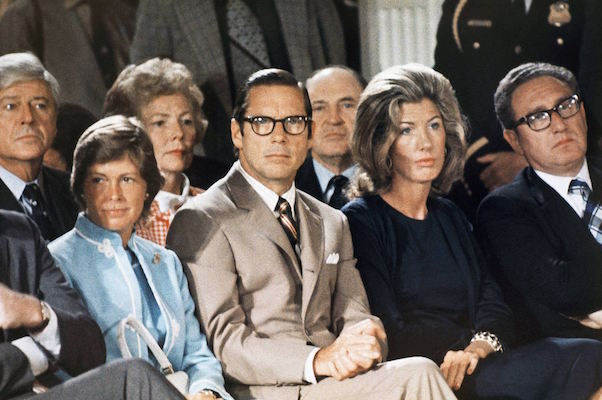Hudson
Friday, August 4, 2017
The Real News Network
“Trump is Turning Against the White Working Class that Elected Him,” The Real News Network, August 4, 2017.
Rising stock prices is not an indicator of financial health like Trump would have you believe, specially when you examine who is buying that stock, says economist Michael Hudson, the author of J Is for Junk Economics.
SHARMINI PERIES: It’s the Real News Network. I’m Sharmini Peries coming to you from Baltimore. The rise of stock prices in the US stock market could be an indication of economic growth and prosperity, but it could also be an indication of the concentration of wealth of the rich and powerful. Which is it? To answer that question, we need to look at other economic indicators. In the press conference that President Trump had just a few days ago announcing his new chief of staff, General John Kelly, Trump took the opportunity to give himself credit for the rising stock prices. Let’s listen.
DONALD TRUMP: We’ve done very well, lots of records created, John. You look at stock market, the highest it’s ever been. Unemployment, lowest in 17 years. Companies are doing tremendously well. Business spirit is the highest it’s ever been, according to polls. You look at the polls, the highest it’s ever been in the history of these polls. We’re doing very well. We have a tremendous base. We have a tremendous group of support. The country is optimistic.
SHARMINI PERIES: Well, on to talk about this with me today is Michael Hudson. Michael is a distinguished research professor of economics at the University of Missouri, Kansas City. He is the author of The Bubble and Beyond and The Finance Capitalism and Its Discontents. His most recent books are J is for Junk Economics and Killing the Host: How Financial Parasites and Debt Bondage Destroyed the Global Economy. Good to have you back, Michael.
MICHAEL HUDSON: Good to be back, Sharmini.
SHARMINI PERIES: So Michael, if the stock prices are not increasing because of what Trump calls “high business spirit,” explain the rise in the stock prices.
MICHAEL HUDSON: The answer’s quite simple. The key is, who is buying these stocks? It’s not individuals. It’s not even pension funds. It’s not the private sector. Almost all the stock purchases are being bought back by corporations in share buyback programs. In other words, companies are buying their own stocks in order to push up the price.
That’s how executives are paid. They’re not paid for increasing output or even for increasing profits. They’re paid according to how much they can push up the stock price.
There are two ways to do this easily. One is to use earnings simply for share buybacks – buy up your own stock and push its price up; or, you simply pay out the earnings in dividends.
What you don’t do if you want to increase the stock price is invest more in research. You don’t invest more in capital. You don’t hire more labor, and you don’t expand your market. In other words, you give up. You say, “The economy’s reached an end. It’s not going to grow from here. We’re taking the money and running. We’re just going to use the earnings that we have to help the stockholders.”
So the stock market is actually the reverse of how the economy is doing.
SHARMINI PERIES: All right, Michael. This might be a little elementary for big-time economists, but explain how the buying back of stock increases the money that they make.
MICHAEL HUDSON: The price of almost anything is a result of how many people are buying and how many people are selling. What’s happened is basically that individuals and the private sector are selling their stocks. Normally this would push down stock prices.
The reason for this selling is that most investors see that the reason why stock prices have gone up is that the Federal Reserve has flooded the economy with low-interest money. People are borrowing at 1% in order to buy stocks that are yielding 5 or 6% and they’re pocketing the difference.
But now, leading investors expect that this debt-fueled price rise is coming to an end. The Federal Reserve says it’s going to raise interest rates. Same thing with the European Central Bank and the Bank of England. They expect higher interest rates to push down stock prices, because it won’t pay people to borrow to buy stocks any more. Most investors today are looking for the stock markets to decline. They don’t want to hold them.
Who is going to want to buy stocks that are going to go down in price? The answer is, the corporations are going to buy it. Corporate managers aren’t penalized if they make a bad investment in their own stock. It’s true that if the stock price goes down, the company loses. This often happens – a huge loss on shares that are bought back. But the company’s managers clean up. They’re paid a bonus according to how much money they can spend to buy up their own stock to support the price.
If you say that you’re going to pay a high price for anything, that will raise the price. Corporations are pouring earnings into their own stocks, not into new direct investment.
SHARMINI PERIES: Why are companies paying out high dividends rather than reinvesting their profits in order to generate more long-term income?
MICHAEL HUDSON: Two reasons: They see that the economy isn’t really growing for 99% of the people. Here in New York, street after street, there are for-rent signs. Small businesses are going out of business. Bookstores are going out of business. Restaurants are going out of business. The boom that’s occurred from World War II to 2008 is over. That’s why companies are not going to invest.
Most of all, companies are buying back their stocks simply to benefit the managers who run them – the chief financial officers and the CEO. CEOs are paid, gigantic remuneration according to the stock price.
This financialization is actually hurting industrial capitalism. Companies have been turned into financial entities. You should no longer think of them really as industrial entities. Corporations make money financially, not by producing goods and services.
SHARMINI PERIES: Right. Michael, could you explain why suddenly we see big mergers going on? For a while there seemed to be a hiatus in terms of these big mergers, but recently we’ve seen Amazon merging with Whole Foods, and some of the major media companies, if not already, are considering mergers. Why is this going on right now?
MICHAEL HUDSON: For two reasons: One is that there is still a lot of low-interest credit available for them. Companies can borrow from banks or from bondholders at low interest rates to buy other companies and create a monopoly. In the past they couldn’t do this because they were afraid of anti-monopoly legislation. But today you have four or five companies controlling almost every major industry. Think of the airlines, cable TV, the phone companies and information technology. They’re all being monopolized, and there are no more anti-monopoly rules.
So what they’re trying to get isn.t really profits. The national income statistics call them profits, but they’re really monopoly rent. They’re rents way in excess of normal profits, because they’re priced at whatever the market can bear. If you have cable TV by what used to be Time Warner, you’ve seen your cable charges go up. Your IT prices also are going up, and your airline prices are going up. That’s because monopolies are now the way to squeeze out money. You don’t have to invest more. You don’t have to make capital investment. You don’t have to employ labor, even. All you have to do is use your monopoly privileges that you’ve bought with borrowed money.
SHARMINI PERIES: Finally, in terms of Trump’s economic plans, how do these trends in mergers and rising stock prices affect the people that voted for Trump, the white working class in particular?
MICHAEL HUDSON: Obviously it’s not helping them. They listened to what Trump said, not realizing that when you’re voting for a presidential candidate, you want to look at who his financial backers are. Who are the donors?
Trump’s donors were basically the monopolists: the Koch brothers, the oil and gas industry, and other far-right-wing corporate organizations that are all in favor of monopoly. The last thing they want to do is help the working class. Trump’s genius was to convince the working class that he was for them, while actually his policies are against them.
Just like the Democratic candidate Hillary was able to convince her constituency, the blacks and racial minorities that she was for them instead of coming down hard against them as the Clintons have done ever since the 1990s with their taxes on welfare, their support of Wall Street, and their support of finance capital. Both parties have the same donor class and they’re trying to get elected by groups in America for whom they have no intention of carrying forth their promises to help their interests.
SHARMINI PERIES: Further, one must note that when Trump and Pence were running for office back in September 2016, they launched their big economic plan that was going to create 12 million new jobs. If you click on that plan now, it goes to an error message and an empty page.
MICHAEL HUDSON: The problem is that any economic plan has to be more than two days long. That’s Trump’s attention span. He is not a long-term planner. He’s just going to opportunistically ride whatever wave there is at a given moment. Nobody I know – whether my old Republican friends or other analysts – has a clue about what he’s going to do next. I don’t think he himself has a clue what he’s going to do next. He’s just going to ask, “What’s in it for me?” Whoever gives him the most, that’s going to be government policy. You can look how at his Russia policy has turned anti-Russian. You could look at his policy saying NATO is obsolete, while he is now pro-NATO. Same thing for his policy in the Near East. He’s gone against everything he’s said. That’s what a smart demagogue does.
SHARMINI PERIES: All right, Michael. I thank you so much for joining us today and look forward to your report soon.
MICHAEL HUDSON: Good to be here.
Postscript:
But it should be borne in mind that Trump’s turnabout reflects his surrender to the Dark Side. He seems to feel forced to give up his natural hope to reach a peaceful accomodation with Russia, unable to take control of the National Security Council, CIA and leakers from the Obama Administration undercutting him. He has not prosecuted Hillary and the DNC or Loretta Lynch and her cronies. By failing to do so, he has let them spread the myth that he is a Russian agent – defined as not supporting the military-industrial complex and new American wars. He seems to have given up warning the people of a coup, except in his damn Tweets – as if keeping his Internet audience achieves the same goal as giving a major address. Without spelling out how drastic the aggressive coup by the military-security state is, he’s unable to provide an alternative.











